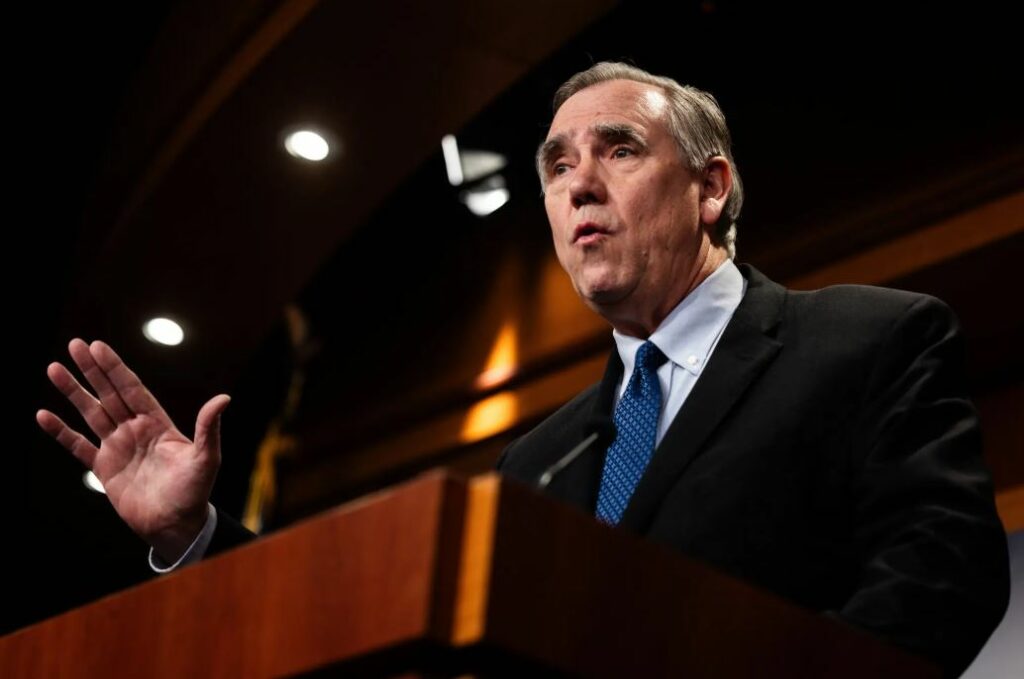

The intersection of politics and cryptocurrency has reached a boiling point in Washington. Former President Donald Trump’s growing involvement in the crypto industry has sparked a fierce response from Senate Democrats, leading to calls for tougher regulations and an official ethics investigation. At the center of the controversy is the GENIUS Act, a bipartisan bill aimed at regulating stablecoins, which is now facing opposition due to concerns over Trump crypto deals and financial interests.
A Growing Controversy
The uproar began to intensify in early May 2025 following a private meeting among Senate Democrats. During the session, Senate Majority Leader Chuck Schumer urged caution regarding the GENIUS Act, warning colleagues not to rush into supporting the bill. Initially viewed as a rare point of agreement between Democrats and Republicans, the bill had been set for a procedural vote in the coming days. However, recent revelations about Trump crypto deals have stalled its momentum.
The primary concern is Trump’s affiliation with World Liberty Financial, a cryptocurrency firm he launched with his sons in September 2024. The company has begun issuing its own stablecoin, USD1, and recently struck a major deal with a $2 billion investment from an Emirati venture fund linked to Abu Dhabi’s government. According to The New York Times, this foreign-backed funding has fueled fears about conflicts of interest and potential national security risks.
Ethical Alarm Bells
Democratic lawmakers were quick to express alarm. Senator Jeff Merkley of Oregon called the Trump family’s crypto dealings “a massive form of corruption we haven’t witnessed.” He emphasized that using political influence to secure international financial deals undermines public trust and national integrity.
Senator Elizabeth Warren of Massachusetts echoed this sentiment, stating, “This is corruption, and no senator should support it. The legislation would make it easier for the president and his family to line their own pockets.” Both senators have formally requested the Office of Government Ethics to investigate the Trump crypto deals involving the Trump family’s ventures.
These ethical concerns are part of a broader pattern. Many lawmakers have criticized the GENIUS Act for its weak protections against money laundering and insufficient restrictions on foreign crypto firms, such as Tether, which has faced scrutiny from U.S. regulators. Some fear the bill, in its current form, would allow these firms to bypass oversight and potentially benefit from Trump crypto deals.

The Crypto Industry’s Role
The crypto industry has been lobbying aggressively in favor of the GENIUS Act. The bill aims to create a clear regulatory framework for stablecoins, a type of cryptocurrency that maintains a fixed value, typically $1. Supporters argue it would help grow the industry by giving businesses more certainty and legitimacy in the U.S. market.
Stablecoins like USD1 are popular among traders because they offer stability that is not found in typical cryptocurrencies like Bitcoin. Companies that issue stablecoins function much like banks — they collect deposits, issue coins, and earn profit by investing the deposits. With the GENIUS Act potentially opening the door to broader stablecoin use, Trump crypto deals could generate tens of millions of dollars annually through Trump’s World Liberty operations.
That’s precisely what concerns Democratic lawmakers. Senator Schumer, in his recent remarks, noted that certain provisions in the bill could allow foreign companies like Tether to operate with limited oversight in the U.S. He urged his colleagues to review classified briefings related to Tether’s regulatory history.
Political Fallout
The backlash isn’t confined to Democrats. Senator Cynthia Lummis, a Republican from Wyoming and a longtime crypto advocate, admitted the Trump family’s actions “give me pause,” despite her general support for the industry.
The GENIUS Act had previously gained traction in March 2025, when the Senate Banking Committee approved it by a vote of 18-6, with five Democrats supporting. One of those was Senator Ruben Gallego of Arizona, who later signed a statement calling for changes to the bill, citing concerns about oversight and enforcement.
In a surprising turn, nine Democratic senators, including four who had initially backed the bill, announced on Saturday, May 3, that they would no longer support it without significant revisions. While their public statement did not mention Trump directly, internal memos circulated by Senate aides cited The New York Times investigation as a key reason for concern.
Influence and Money
Crypto companies spent more than $130 million during the 2024 election cycle, funding candidates across both parties. High-profile Democrats like Senator Elissa Slotkin of Michigan and Representative Sam Liccardo of California received industry backing. But now, even these lawmakers are distancing themselves.
Liccardo, speaking from California, noted rising discomfort among Silicon Valley crypto leaders. “There’s deep concern about how Trump has wrapped this industry into a kleptocratic scheme managed by his sons,” he said.
Meanwhile, Trump remains defiant. On Monday, May 5, he posted on his social platform, Truth Social, encouraging followers to invest in $Trump, another cryptocurrency tied to his brand. This new venture has already generated over $100 million in fees for his family and business partners.
That same evening, a super PAC supporting Trump hosted a fundraiser at his Virginia golf club, where crypto executives were asked to contribute $1.5 million each to attend, a sign of how closely intertwined his political ambitions and crypto interests have become.
What’s Next?
A version of the GENIUS Act is still being considered in the House. Democratic leaders are planning symbolic protests, including a walkout during an industry hearing scheduled for Tuesday, May 6, to highlight their opposition to Trump’s involvement.
Negotiations continue behind the scenes. Senator Kirsten Gillibrand of New York, a co-sponsor of the bill, is working with colleagues from both parties to revise the legislation. However, with trust eroding and the spotlight on Trump crypto deals, the bill’s future is uncertain.
As scrutiny deepens, the central question remains: Can legislation that shapes the future of finance be passed fairly when it so clearly intersects with a powerful political figure’s business empire?























